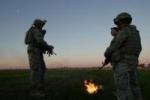Lemons, who is back at work at his skateboard company, had strong and unsettled feelings about his time in Diwaniya. “I am still trying to figure out the lesson,” he said. “Maybe the lesson is there are limits to what we can and cannot do in Iraq. I’ve tried separating myself from our work with the Sahawa” — Awakening — “and I can’t. I can’t ever face the tribes I worked with again because I broke a lot of promises. Those promises don’t mean much to anyone outside Diwaniya or to an overall strategy for this war, but I thought these were the promises my own government had sent me year after year to pursue. So while I would deploy again for my Marines and my Iraqi Army comrades, I don’t want to go to Iraq again if this is the way we do business.”
Gildroy, who is once again a civilian and who left Diwaniya vowing never to return, says she still believes Petraeus’s counterinsurgency strategy is producing results. “This war is critical to our national-security interests and has had an impact on Al Qaeda. I know we are creating a buffer zone,” she said. “We will not create a well-functioning democracy in Iraq, but we need to leave the region and Iraq in a stronger position than we went in both for their own security and to avoid another terrorist attack on America. I would do whatever General Petraeus asked or needed. I trust him and his character with my life.”
Moulton, who is headed to graduate school this year at Harvard for a joint program in business and government, said the episode illuminates both the importance of the south for the politicians in Baghdad and the brittleness of many of the gains. “Together with some brave young Polish and Iraqi soldiers, we did a lot to improve life in Diwaniya,” he said. “I can’t deny that. People were afraid to leave their houses when we arrived. Iraqis were crying when we left. But so much of what we did fell apart so quickly. It shows how fragile everything is today in Iraq. For all that we put into it, not least of all a year of our lives, I don’t know if any of it will last.”







Bookmarks